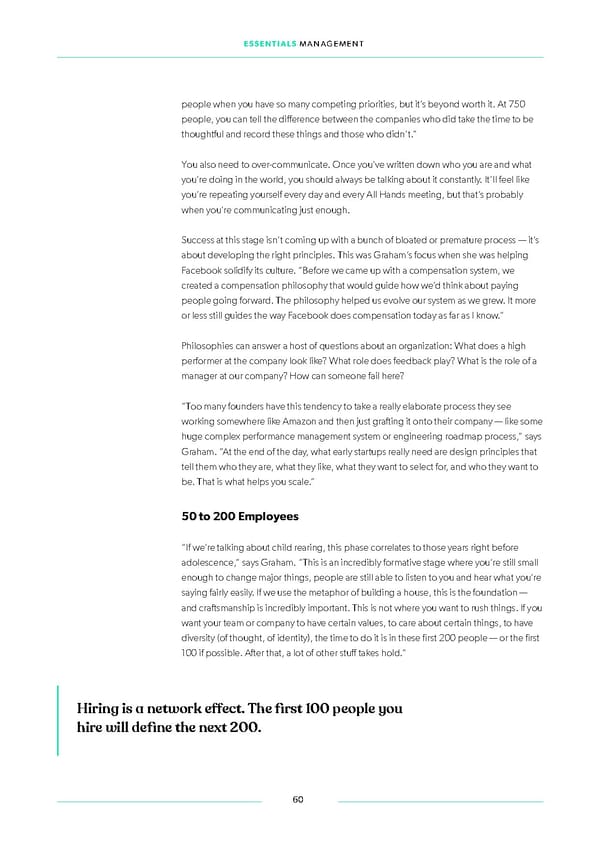ESSENTIALS MANAGEMENT people when you have so many competing priorities, but it’s beyond worth it. At 750 people, you can tell the difference between the companies who did take the time to be thoughtful and record these things and those who didn’t.” You also need to over-communicate. Once you’ve written down who you are and what you’re doing in the world, you should always be talking about it constantly. It’ll feel like you’re repeating yourself every day and every All Hands meeting, but that’s probably when you’re communicating just enough. Success at this stage isn’t coming up with a bunch of bloated or premature process — it’s about developing the right principles. This was Graham’s focus when she was helping Facebook solidify its culture. “Before we came up with a compensation system, we created a compensation philosophy that would guide how we’d think about paying people going forward. The philosophy helped us evolve our system as we grew. It more or less still guides the way Facebook does compensation today as far as I know.” Philosophies can answer a host of questions about an organization: What does a high performer at the company look like? What role does feedback play? What is the role of a manager at our company? How can someone fail here? “Too many founders have this tendency to take a really elaborate process they see working somewhere like Amazon and then just gratfing it onto their company — like some huge complex performance management system or engineering roadmap process,” says Graham. “At the end of the day, what early startups really need are design principles that tell them who they are, what they like, what they want to select for, and who they want to be. That is what helps you scale.” 50 to 200 Employees “If we’re talking about child rearing, this phase correlates to those years right before adolescence,” says Graham. “This is an incredibly formative stage where you’re still small enough to change major things, people are still able to listen to you and hear what you’re saying fairly easily. If we use the metaphor of building a house, this is the foundation — and cratfsmanship is incredibly important. This is not where you want to rush things. If you want your team or company to have certain values, to care about certain things, to have diversity (of thought, of identity), the time to do it is in these ifrst 200 people — or the ifrst 100 if possible. Atfer that, a lot of other stuff takes hold.” Hiring is a network effect. The ifrst 100 people you hire will deifne the next 200. 60
 Essentials Management First Round Capital Page 59 Page 61
Essentials Management First Round Capital Page 59 Page 61